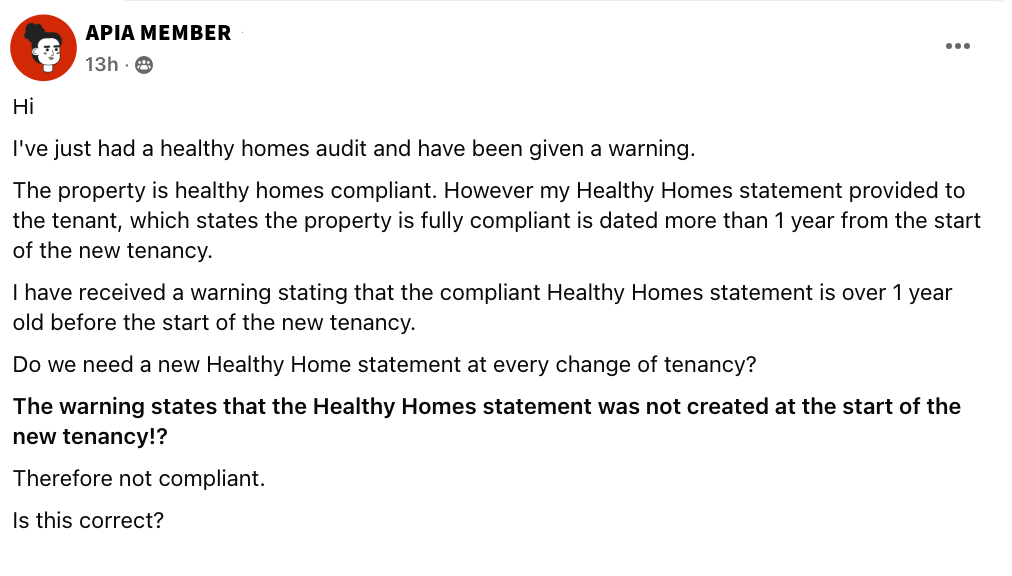So one of our members, G, recently went through a Tenancy Compliance and Investigations Team (TCIT) assessment and posted this on our Facebook:

Looks like we need to clear up a couple of things about Healthy Homes Standards (HHS) compliance – not just about those compliance statements, but also what’s what with property inspections.
A New Statement for Each Tenancy (Yes, Really!)
Don’t begrudge the TCIT. They are just following the law.
Section 13A of the Residential Tenancies Act (RTA) explicitly requires the landlord to include in all new, renewed and varied tenancies a signed statement that ‘on and after‘ the start of the (new, renewed or varied) tenancy, the landlord will comply with all HHS requirements. ‘It is the “on and after” that effectively prohibits a landlord from recycling a statement from a previous tenancy even if the property has sustained no change whatsoever,’ says APIA general manager, Sarina Gibbon. However minor or inconsequential this may seem, the TCIT is raise it landlords.
In plain English? A fresh statement for every new tenancy. No shortcuts!
What You Need To Do
Keep it simple:
- New tenancy = new statement. E-V-E-R-Y-T-I-M-E
- Hold onto your compliance documents for at least 12 months after the tenancy ends (s123A(1))
- Meet HHS compliance by compliance deadline and keep your property compliant throughout the tenancy
What You Don’t Need To Do (But May Want To)
Here’s a surprise for you – those professional inspections everyone’s talking about? They’re not actually required by law.
There is some general confusion over healthy home inspection reports in the marketplace; some landlords mistakenly assume that inspection reports provided by third parties are mandatory. They are not. “I can see how it is a mistake that can easily be made,” says Sarina, “A ‘Healthy Homes inspection report’ sounds awfully like a ‘Healthy Homes compliance statement’. The former is elective, the latter is mandatory.”
Don’t get us wrong – getting a professional to check things out can be super helpful if you’re not sure about the requirements. But it’s not a must-do.
Read the Fine Print
If you do decide to get a professional inspection, don’t assume everything will be hunky-dory. As Sarina says, “The healthy homes standard inspection industry is not regulated, and it is not uncommon for terms and conditions of these reports to include some form of ‘all care and no liability’ clauses and ‘indemnity’ clauses that could nullify the effects of the report if information on there is incorrect and leave the landlord with no recourse.”
What does that mean for you? Even with a professional inspection report in hand, you could still be liable under the RTA. “At the end of the day, the landlord is still accountable for the accuracy of healthy homes standards statement and is required by law to maintain compliance throughout the tenancy,” says Sarina.
Making It All Work
Here’s what we suggest:
- Don’t skip creating new statements for new tenancies – it’s not just paperwork, it’s the law
- Keep solid records of how your property meets the standards
- Remember professional inspections can help, but they’re not mandatory nor will you likely be protected if the report is inaccurate
- If you do get an inspection, read those terms and conditions carefully
- Think about getting some training on the standards if you want to do your own checks
The bottom line? Getting your paperwork right and knowing what’s actually required can save you a lot of headaches down the track. And that’s what we’re all after, right?
This article is intended for general information purposes only and should not be considered legal advice. While we make every effort to ensure accuracy, laws and regulations can change. For specific advice about your situation, please consult a qualified legal professional who specialises in residential tenancy.
















Add Comment